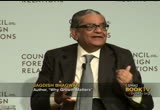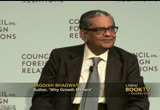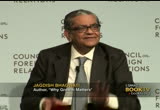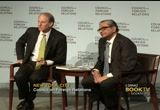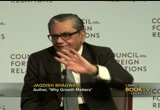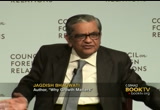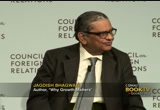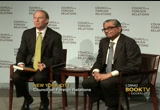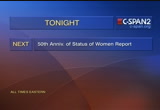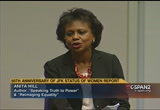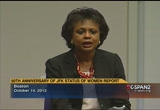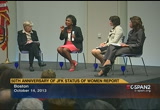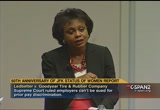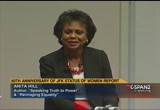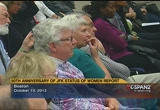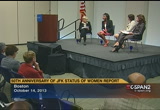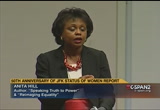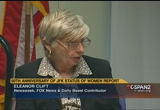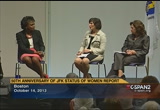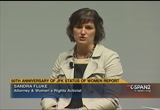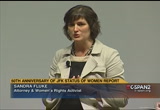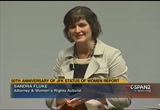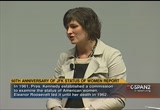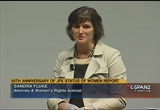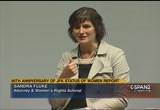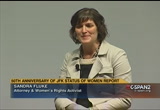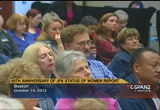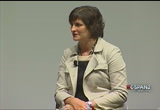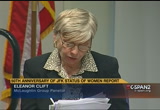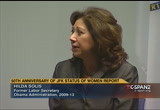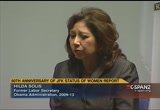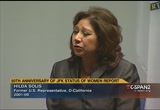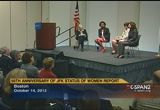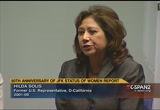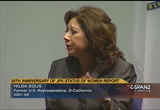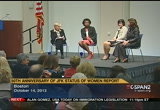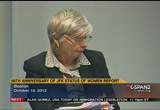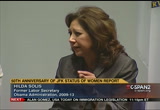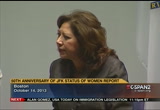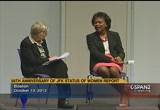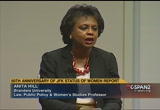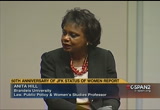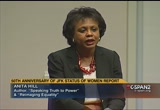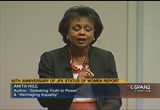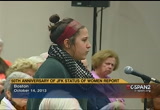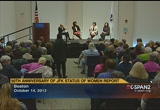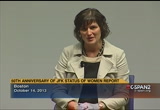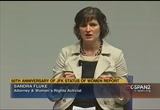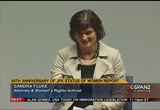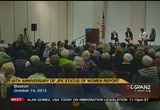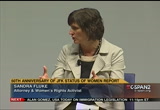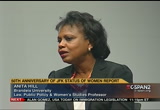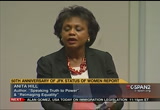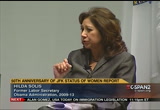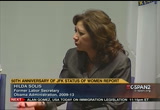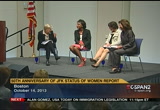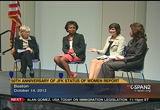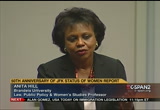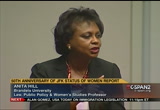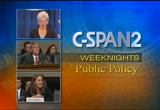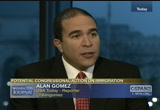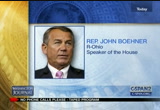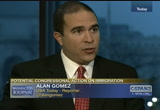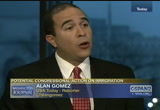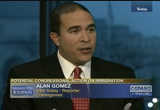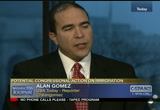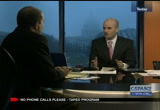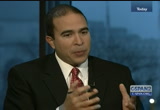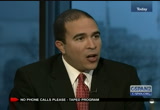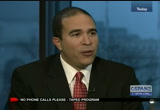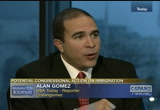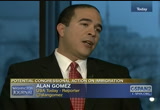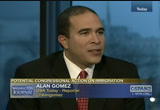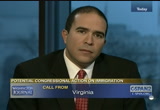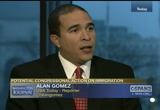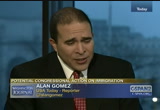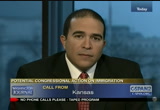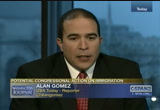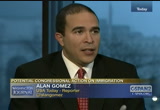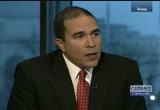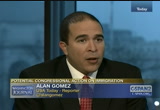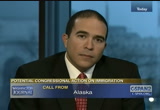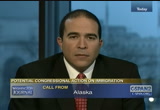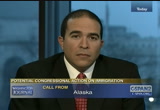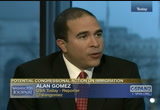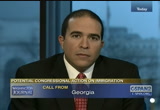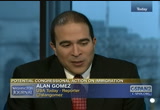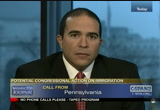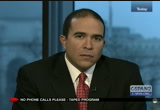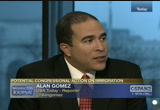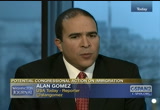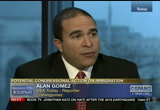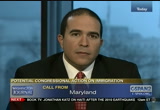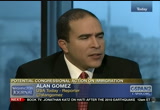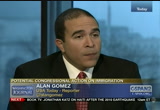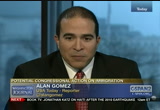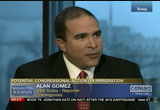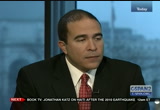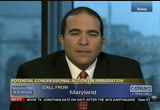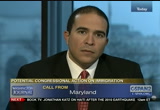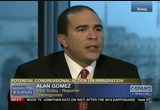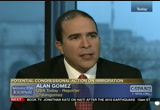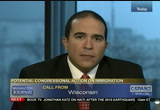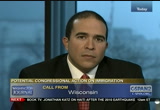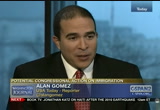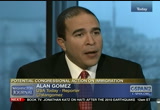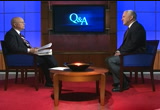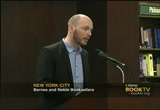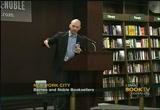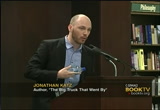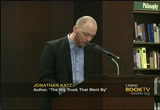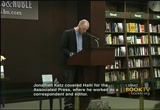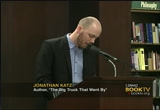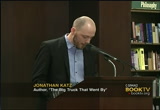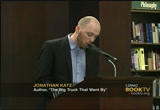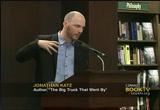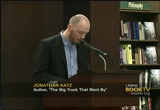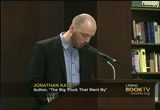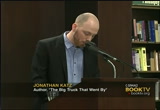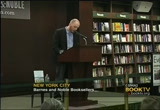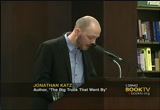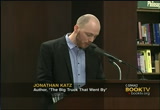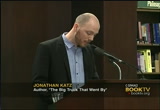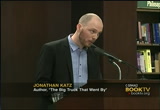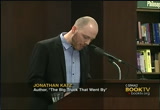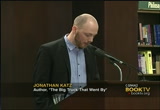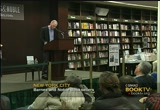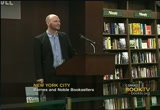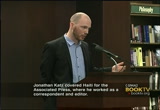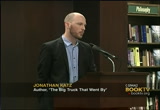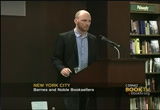tv Key Capitol Hill Hearings CSPAN January 2, 2014 10:05pm-12:31am EST
10:05 pm
wants to spend more on social spending. like the security bill. you have the attention. then board monday being spent you don't have to be a macro economist, i am not one, but to know that you get inflation. big inflation is in the position to be very dangerous. the big question mark of the economy now. related to the situation is exactly the opposite of what we have here. but we have here cannot get off the ground. the violence is out of lax -- what. what about the central government? [laughter] other then what is run by my
10:06 pm
students of macroeconomics. [laughter] >> maybe that is not a compliment. [laughter] >> for me it is because i know nothing. [laughter] so now i say that what you have this a situation with the fiscal policy with money supply has helped the country because it was not grow ring some of it was sent abroad to leading to a decline of the dollar. leading to more prosperity. so when it comes to india
10:07 pm
cover the opposite but vitarelli applied the brakes. doing that it will be very unpopular. they don't have the autonomy that the federal reserve in juries. -- in joyce. i am right about the situation that somehow looking at social spending have you ever tried? is very hard to. >> especially with the of run up to election. if mr. moody is elected what about changing the economic policy? >> very substantial. the last two years the european government has not
10:08 pm
undertaken any significant changes. it could also mean stymied by the charges of corruption. maybe with the ethnic might blunt dash bias with the prime minister that i don't write about the matter but to be incorruptible he has never been accused of any corruption. just like the prime minister. he has not been forceful. he is very forceful and is a fantastic speaker. in 2002 it was the and it to other people but i would not go because it had cleared and now there is nothing
10:09 pm
against him. so i went there and it is from the best american politicians. nothing i could tell you exactly what he had been doing. astonishing. absolutely. and if we get elected but not a good run for his many -- money it is for the leadership right now and you don't see that in the newspapers like he gets all over the country. the rallies that he never used to get. so i think he should
10:10 pm
capitalize:that to change the style of the government. i think we have some hope. >> another question. >> a microphone is headed your way. >> could you comment primary secondary and tertiary education in the role the public sector should play in it with growth? paradise think back to the debates we have had people criticize to say that education is more important than growth and so just having the education is not
10:11 pm
by itself but if you try to be more productive continuing to the secondary sector but education is important it has to be dovetailed into a changes even considering grows beyond what you have. just to say it is important is not the look at singapore they can export to a lot cover they turned inward in india with a lot of machinery with the latest technology. but some -- education by itself is not irrelevant. >> this is a rare economic co said as the happy ending the book about how economic policies have done right.
10:12 pm
and you have some case studies clearly that those of you that economics is the old saw here is your chance to look as a cure for science. then we owe a great debt to you being here tonight for your years of sustained riding, talking, and thinking as someone who has informed the policy debates of this country. thank you. congratulations. [applause]
10:14 pm
>> [applause] i am just going to use it back. [laughter] end taken from here. seriously anita hill was thrust into the headlines more than 20 years ago when she testified before the senate judiciary committee in front of the hearing for supreme court justice nominee clarence thomas. the televised hearings galvanized women politically and we have a the year of the woman 1992. [applause] record numbers when elected
10:15 pm
to congress and since then professor hill has been writing and lecturing around the country and around the world on public policy and women's rights. professor hill's, could you just give us a window -- window into what that experience was live and maybe reid direct your vision with the intervening decades? >> a big window. [laughter] i will say it was columbus day weekend 1991 when i testified. it is very interesting as captured in the story over the weekend in 1991.
10:16 pm
, there were people all throughout the wedding party and it was men versus women. i think there are lots of arguments that took place about women's real experiences in the workplace that women said that sounds very familiar. then, i will say if it comes back to the saugh -- we have, all longways in state to 91. one of the things that i think is most compelling is us to talk about it. in 1991 people didn't a and one of the of liberating things socially is in so
10:17 pm
many ways have dropped a the shave of those experiences and for many of us we stopped believing aerosols to move on and make positive changes for women in the workplace. that has been 22 years of working really hard and we're not entirely there yet but we will be moving in the right direction. after decades, scores decades, scores, thousands of years to get us to very real are now it will not change over 22. it is a snapshot of over 50
10:18 pm
years ago with the status of women. we have been charged to talk about where women are today. we have a lot to cover. [laughter] but in preparations i did go back to listen to that tape of kennedy used eleanor roosevelt. after the pleasantries mrs. roosevelt's said why aren't there more women in the united states? we are privileged, why are there not more of leaders? when i was going back through to figure out how every talk about where every are today, we have to be willing to act like eleanor roosevelt to it, asks the
10:19 pm
difficult questions. the questions that maybe a little bit embarrassing but are there to engage in a direction that perhaps the president was not thinking about when he entered in the conversation. today i want to talk about those difficult questions leadership and other things i care very much about with research specifically than to also sexual harassment and a less rigid of a topic that is not covered very much.
10:20 pm
but think about where every are today in terms of women leadership. maybe 20 years ago. to women and 20 years later with the most recent election, there are 20 women in the u.s. senate. that is progress and how the conversation might have been different in the chambers of there were 20 women rather than the two that were there , 20 years ago at the senate judiciary committee of the supreme court, there
10:21 pm
were two sitting women at that time. then there were three sitting justices on the u.s. supreme court and now that is progress said one is retired with sandra day o'connor. that is progress. but talk about asking the next question, we can say that is great to be on the supreme court to make in -- decisions to impact women's lives but we cannot be satisfied until we are able to say we can sustain that. how are we going to be able to sustain that? looked at the time line what the courts looked like. women getting to that of
10:22 pm
leadership position that is the next question. not whether or not we made progress but if we can build on that. what is the structure that keeps us from being able to do that? that is the next move if we have to make. if you don't think we did would make a difference difference, think about justice ginsburg and elite -- leave the better. had she not read that i am absolutely certain they're not would have been so much momentum for congress to actually act to rectify the supreme court's decision. she did not change your decision of the court but
10:23 pm
that impacted decision we need to be there and to interpret the of law that affect women's lives in and we need to be the reality check. >> a couple of other points then to move god. i have been dealing with a number of issues. one of those is medical research. i have been involved with dr. paulette johnson who could not be here today but the director of women at brigham and women's hospital 20 years ago congress passed
10:24 pm
the national institute for health revitalization act. you probably did not note it because i did not know its that when it was passed for the first time that nih grant was given in and the grant was funded the law required women and people of color be part of the research. before then you could do what you wanted or only been. after that there was the requirement to include women and people of color but with cardiovascular health, still today only 35 percent of the research projects include women.
10:25 pm
and said only 31% breakdown the information based on gender. what is that doing? it is creating a gap. for what is actually happening for research. you have to ask for the next question. we have the law in place but is it having the effect we want it to have? we could talk about women of the foreclosure crisis where women were targeted for some farm loans are the most toxic loans during this period.
10:26 pm
those were the most likely to be foreclosed. unfortunately that had to be followed through in many women were losing their homes as they become housing insecure because more are paying more than 50% so then with the law's intent in the lives that the women are they doing. in 1981 we did have the civil rights act of 1991 for the first time began women were able to recover their lost so what has happened is
10:27 pm
women can make claims or soup but they have to have the jobs, that need to that income are not taking its vantage of that. the problem with sexual harassment in colleges universities is just now beginning to become a part. all of those things we have made great strides but we have a long way to go. >> thank you. worried about the pipeline for women is the legal circles but to think there is nothing to worry about.
10:28 pm
[laughter] she stepped forward to february 2012 with congressional republicans prevented her from testifying with and front of a panel of the bet with the affordable care act definition of contraception is part of preventive care for a given. she was vilified in became the heroine for women speaking as the democratic national convention in. also the same question that i asked anita hill although less than two years with that experience that was personal and public how it affected you end changed your life a unit mission and? >> it gave all of us a window into what was happening with the state
10:29 pm
legislatures as well as congress. unfortunately we are not paying as close attention and as we've might have done. that was a moment translated into a long-term bull did throw the 2012 campaign where throat the country in the end you were paying attention on reproductive health of justice and human-rights. but now this should not be a moment that passes because the election takes that. that is one of the places we are today with the status of women very much not only for legal control in that respect but also to fight
10:30 pm
for the economic ability to actualize that control that is what end of the moments that is not the end of the story. so did the women came to be few said i cannot believe we were talking about birth control. i thought the fixed liz? raise your hugh did you thought we fix to this. [laughter] thank you for all you did but unfortunately we are not done yet. this is a generational moment where maybe for the women there was a reminder the fight the did to go on air perhaps for young women and introduction to this fight the have come to say
10:31 pm
they showed up for the fight finally. but 2012 with those events is a moment where young women and connected with each other more than they had the floor. so to tell you the membership increased exponentially and many were young women and a young band connecting to the mainstream organizations. id eleanor roosevelt said realizing 88 yourself from the process to accomplish the goals but also to realize that we not only have to have leadership to our young people but give them opportunities as well.
10:32 pm
it is a writer for the whole country but a reminder of generations working together in this effort so we can make the most progress. but listening to what we've heard about the commission's report its is striking so much has changed but so much has not. you listen to the equal pay, but child care, equal rights amendment, these are all still zero issues has evidently that they are still working on an end to are still fighting all the battles it is encouraging to see there are ways we are changing and the tactics to
10:33 pm
go into a different area. in particular thinking about the organizing efforts and the of fast food strikes i am sure you have seen those fish your web refers to open and today we've made reference 50 years ago the march on washington and we forget that was for dignity and jobs. one of the request was to dollars per hour but today it is right around $15 and fast-food workers are fighting for a huge debt is not what you'd traditionally would fate of but two thirds of fast-food workers maybe they were single mothers and that is a very real example
10:34 pm
with organizing what it looks like today. and brains together the economic advisor rich the domestic workers organizing a campaign was sharing pair were rumors were supposedly she would get together then there is no one to clean your house this was one of the reasons shaber was despised on that point as well as many others. so we see incredible progress there largely about the female work force but the ways and women's work
10:35 pm
quote-unquote is always associated with the women. we have to do with that like secretary hilda solis did the way that this generation we are moving forward on the issues of. >> talk about the issue of harpies. [laughter] >> your group the young infants abels i have heard that term applied to young healthy people that will not show up to purchase health care. >> the young in vincible says one of the of groups not speaking officially but took the name for those who
10:36 pm
wanted health care reform because we thought we were invincible. we're the most undeterred generation is desperately in need of health care reform. to set up in droves because it is so important. and then relating to the affordability of education and employment. and to look at those affirmative action it in terms of the status of women of color. and with a path for verge. >> what made you an activist?
10:37 pm
was said your mother? >> anyone who has a truce zero of the activist so i don't have an excellent answer to that question with a strong sense of right to andron from ignorance and they were a little more conservative than i was. and we very much agree we're not allowed to be on the sidelines. pick up your to will and fight. >> in excellent answer
10:38 pm
former secretary of labor hilda solis has a long and distinguished career in electoral politics first elected to public office 1985 as the member of the unity college board of trustees and then became the first leg to get elected to the california state senate and then increase the minimum wage from $4 to $0.25 at $5.75 per hour in 1986. still not the of living wage i am sure whatever it is now. and looking at several terms in the congress labor laws the environment but i would
10:39 pm
like to start with your view talking with the former fifth place of employment. follow suit responsory this event those that will continue to speak with the kennedy library foundation the first to receive the jfk profile in courage award because of environmental justice and raising the minimum wage back when senator kennedy was alive this is the third time i have been here and i am dying those folks in
10:40 pm
congress and i could not go to the library because of the government employees were furloughed. so much happened in the last 50 years but so much more has to be done with an interesting person not mentioned is somebody that i've looked up to is francis perkins who was the first department secretary and she was able to have the discussion at that time anti-in the room with others defending the rights of children to try to eradicate that and also create social justice in a way to placate
10:41 pm
all communities where they sit with a bunch of in a great young women and there was no way to escape because there is no safety protection and. and for those that were trying to make a living where we see many reforms in the workplace injury here about those great things happening and there are cabdriver's out there but we see where women have spent
10:42 pm
stock and i want to give you a statistic. a woman of color who was african-american and latino only makes $0.64. that gap is there this is so noticeable to make sure we have good enforcement that the department of labor can hire up so the knicks do not go into a pile and people actually get a callback and issues like this are resolved and investigated. it is required by law in any
10:43 pm
federal contracts that go out that they treat individuals fairly women, the people of color common disabilities, i seek what has happened is we got a comfortable we don't even and indeed an office for the women's bureau and a date goodness their voices were heard and that is discouraging because there is so much more to do. maybe if we are more used to the notion to be more acceptable but when you look at the statistics it does not bear that out that is why do kids out the grants for jobs where contracts are things of that nature who
10:44 pm
moves up the ladder at the government level? there is the disproportionate amount that are not getting into the it senior executive management position and very few men and women of color and i say are they equally applied across the board? maybe we lose sight we pull back because of the era of so being hypersensitive to talk about the white elephants in the room is time to bring those barriers down in my opinion help to set a standard by bringing more women and people of color into his invitation i
10:45 pm
had the opportunity to serve as the first latino woman. hopefully the next president , she or he could have the opportunity to truly represent the american end public best thing is never given and you have to work for it. don't believe for a minute blind dash minute that we don't have so far to go or other people looking up to us to continue the fight. young or old every corner of this world they say please don't give up. read the to have equity, the family medical, to implement the public and private sector we have to change the behavior of corporations that continue to do discriminate in don't come
10:46 pm
pay compare bulwarks a we have a long way to go but i am happy the can have these open discussions with more men to control the of the average of power -- the leverage of power to do the right thing for every friday. >> while you were speaking earlier joining the obama administration there was optimism early 2009 but you watched that e. road and now trail the gap workers that are furloughed a huge with the anonymous bureaucrats but they are real people all lots of them are people of color and government services is one of the great ways to insure the
10:47 pm
middle-class. >> for many of us that grew up we understood that the government could allow for more balance and a level playing field of education or job creation. now the public is very anti-government. not just federal but local. the tip of losses experienced over five years it is tremendous. 600,000 jobs were wiped out and most were women teachers, firefighters, peop le who do your local government. to see that the recession is a slap in the face for people whose try to come up for those diverse communities. as our economy recovers we need to back fill the position and who is in line? and encourage people not to
10:48 pm
be down on federal or state government it is something more simplistic because someone who takes care of my mother or your father with the imprimatur care, pick up my dad, the veterinarian veterinarian, pads, the street corner, the lights are out. when there is a major accident? where people lose their lives? who inspect the poultry? we have a crisis in california right now. we have tuesday to about what that means to our society to pay some form of tax but people say it is almost us in to pay taxes but proportionately speaking people in the middle class and lower pay a higher percent they and the 2%.
10:49 pm
and the wealth of those has increased 200% is down to about 20. that does not equate or compare. people need to wake up the disparities existed and we have to correct them because people in the their voice is heard. i hope they are encouraged to get harpies out of spec also with the revenue reduced but your bio says to encourage positive resolution of race, gender, and class issues. >> how is it going? [laughter]
10:50 pm
>> i like to say when i was coming up of a guy thought all of this would be historic to talk about how things used to be but we have not changed hands it doesn't mean we stop or stop trying to make things better. the things that i try to do is every bet becomes in their own way and that is what we have to understand. not that i want run for public office but to those who have a function in life
10:51 pm
has the opportunity to promote. i said to a woman who was part time right now. everyone of us has a role that we can play. it is not easy in this era of post identity where most of us did not realize where all the of, ism is gone in and we have to be thoughtful where are the gaps of the loss? what are the new strategies? who are the decision makers? what tuesday's me to go to make the best decisions? in the long term is it important is it necessarily
10:52 pm
that women are bottled as a group? out of course, not. i don't think we are but what benefit when we start to drill down to look at women's life experiences or their life cycle so we are not just talking about one say that leads for the big like child care but what needs to happen for with a bid from the time they are born to prove it to adzes of successful outcome but the time we get older it become the board empoverish. we have to be smart and thoughtful and you'd look at the impact of race on a woman's experience. what is a like when you
10:53 pm
quote statistics of limited of color with the wage gap? what is it like to be a woman of color or $0.94 to the dollar? even in the terms of the judiciary one-third are women. but let's get all the federal judges that are women of color. so what does that to? we have to look at this holistic lee -- a holistic play as of the complex so there are no simple solutions. but it does begin a and i
10:54 pm
thought about this things can change. i testified date to 91 and was getting lots of letters. i still do. i was between 80 and 90 percent of the letters that i got over from women. over time now going on 30 years from the field has changed. i am getting more supportive letters from been talking about the experience of the sexual harassment or to speak out for what they believe. but they put it into a positive treated you fault the way that some men come through their experiences of their daughter, but what is there?
10:55 pm
some kind of sympathy. some ability to relate to what it is like to make a positive change and me confronted by people who do not want them to change. that is how we will be able to move. when brinded error and more ready to support their family everybody benefits. when did it can live -- everybody benefits if we have to begin to understand those differences but not lose focus of the fact there is still a gender disadvantage in this country. it is interesting 50 years ago it is so one of the
10:56 pm
premise that they start with there is a disadvantage to being a woman in this country. is still exist. but we have to make sure people understand disadvantage is not criminal well but the entire society suffers because of that. >> you talk today about civil rights and women's movements i want to ask teeeighteen about organizing the first to the question here. >> as you pointed out before i made the women's rights awareness group in my high-school. i ask one of my male teachers what he thought. he said if you make a feminism club then the boys to have to make a masculine
10:57 pm
club. i said with all due respect the united states of america is the of masculine club. [laughter] [applause] so the question is to part because i looked around i don't see enough girls at my age here and i worry about what i have to do as a leader to first be taken seriously because i did not feel that my activism was taken as seriously period how do i take that to the cause but i feel they don't know exactly what that means >> i have so many things to say. [laughter] an excellent question.
10:58 pm
we are all. don't ask us. sorry. [laughter] tell us. towel us what would train young people into this conversation. item i am constantly trying to seek of ways to reach to various audiences to activate adequately and the key is to ask those groups of each of us a special young women in the conversation to take on the responsibility to figure that out and telling the rest of the movement hoping other aspects of the of leadership on what it will take. i also want to offer another response to your teacher
10:59 pm
which jurors was very good. [laughter] but let's run the conversation was a feminism club would focus on and what the goal would be. 50 years ago with the status of women today we have the commission's with similar titles it an office in the white house to focus on women and girls but if we did not have that history what would we call it if we were starting fresh today? would be calling it more like commission on gender or sex inequality? that is absolutely not to erase the you began disproportionate impact that discrimination as but what are the of ways we are harmed by a sexism?
11:01 pm
gender limits all of us is absolutely what that fight is about. that type of a frame, i think, is an interesting thing to think about for where we go forward from here because it does bring other people into the conversation and into the fight because why aren't the boys part of the feminism club or gender equality club? i hope they are. there were quite a few guys in my such group when i was a student, but that absolutely does not mean we in any way lose focus on what is still the disportioned impact on women in this country, especially considering violation against women and those types of concerns. >> uh-huh, thank you. >> yeah, i mean, so does she go and try to recruit friends in school individually? how does one go about sparking a
11:02 pm
movement? seems to me what happened in your case was that the issue of contraception related to the affordable care act actually made young women think that they had a stake in this. i mean, it's believing you have a stake in some political fight that gettings people interested, and people have a stake in all these fights, but they don't make the connection so i guess the issue is, how do you get them to see that they can actually have an impact on washington? >> well, it seems that we're coming at it from the wrong direction; right? rather than convince people they have a stake, shouldn't the question be that we ask what is it you're worried about, what's not working in your life, that you want to fight for, okay, let's organize around that. that's when we feel they have a stake, and perhaps that opens the door to further conversations of, well, you know, here's a policy that you
11:03 pm
had no idea was impacting your life, but let's talk about how that relates to this concern that you have, but it can't be a top-down, you all should know you're should be concerned about x, y, z. that's not going to gal galvanie people. >> i think there's a lot of ways to galvanize people. everybody's different. what reaches some people won't reach other people, but i do agree with you that when you have to get to people what they care about, what really do you care about some are concerned about things that are ideas, and others are concern about things that are their data day living. -- they have day-to-day living, and so much is coming out of washington, that we organize -- i don't think we have to organize around the politicals. >> right, yeah.
11:04 pm
>> i think we need to organize around what is going on in our lives, and i mean if you want to think about in terms of what you're going to change in washington, that's one thing, but you might want to change what's in your workplace. what people are being requiredded to do, whether or not people are going to have vacation or sick leave or whether or not how people are being paid in their workplace or, you know, whether people are given leeway to go and take off and take care of a sick child or a sick parent. i mean, all organizing doesn't have to be directed in washington, d.c.. we can change the way we live and the way women experience life. >> well, maybe that's the big difference between 50 years ago and today because 50 years ago government in washington and
11:05 pm
politics was seen as the most direct avenue for change, and -- >> well, -- >> an overworked term. >> we have to fight op multiple levels. i, of course, as a lawyer, yeah, women should be encouraged to sue for their rights. you know, is that so radical when you saw that as a headline? yes, we should be suing for our rights, but that should not be the only avenue. what we have to realize is that when you talk about people who are vulnerable, economically or socially, they are not going to go to the courts because, one, they can't afford to or they can't even project what the outcomes will be. their ought to be other avenues for us to move people forward that don't require us to file a lawsuit. i'm all for the trusts, but they should not be required for us to
11:06 pm
move forward. >> right, right, well -- >> can i say something though? something i think is important as well. while we see dysfunction in washington playing out in the last four years, quite frankly, people have to be reminded that a lot of things happen locally, and that people shouldn't lose sight, especially women. we are losing so many good women that are now just waiting for running for public office. in los angeles county, we just had an election on the city counsel out of, like, 20 members, one woman. she's barely squeezed through. this is horrendous we are going backwards, not forwards. the california state legislature, we lost ground in having more women state senators, and ask the questions why, do they not have money or support at home, is there structure in life such it does not allow them to have time to do that? these are questions we need to
11:07 pm
ask ourselves as a society and figure it out if we really want to see equality, and while i don't think everyone is made up to get into politics, it's an important voice because when you do have women who look at things very differently. it's about the group, and it's not about my having power over saying, gee, i won that one, and i think a lot of women in leadership in legislature help groom and mentor other women and her effect so profound, really underestimated now, women in this day and age don't understand the contributions this one woman made, and in
11:08 pm
keeping at bay, also, people alongside her who would love to have her position, so, i mean, think about that, maneuvering the house, built, and work with the president at that time to get ledbetter and other good legislation. thank goodness we have good women in the senate in the and in the house because we were able to get the funding we needed at a time when the other side says, oh, no, the government is too big, and it's outrageous when the unemployment rate at that time was 10% and maybe 16 and 20% for people of color. in communities around the country. i want to ask each of you, sandra, way you see on the horizon that can give us some reason to be happy about the
11:09 pm
progress we are about to meet. >> the raising of why, you know, aren't we seeing more women stepping forward into office and into leadership, you know, sometimes i worry it's because we spend a lot of time talking about barriers. it's good to acknowledge barriers, and absolutely, that's how we work on them, but we have to not get stuck there, and as individual women believing we can't do it because of all of those barriers we're aware of. you know, i don't want to run for office because i'll be attacked and vilified in the press. >> well, we're all still here. if the three of us can handle it -- [applause] rock stars perhaps, but superwomen know if we can handle it, so can so many women, and we need a lot more belief in
11:10 pm
ourselves in that way because i suppose that's my optimism in the end is that we have the capacity to change all of what we've been talking about today. we will eventually. we will. >> right. i think fdr took criticism, it's a badge of honor, wear it as a badge of honor. >> yeah. >> you had your share of criticism. >> of honor. >> yeah. [laughter] >> i have. it's amazing, i always tell people if i'm optimistic, anybody should be. [laughter] what makes me optimistic, two things. one, again, so much has changed. i've search it in my lifetime, and if i think about, you know, the fact that i grew up in rural oklahoma, not australia, but in rural oklahoma, the life chances that people would have given to me for on african-american girl growing up in rural oklahoma,
11:11 pm
one, getting to law school, garage waiting from college, yale law school to be able to move and work to where i am today, and as i tell people, i'll move all the way from oral roberts university so i've come a long way. all the way across the spectrum, but the chances of that happening for me were not great. they were, in fact, very small, so i know what we can do and know what's possible, and i also know that we didn't do it alone. i did it because there's a lot of people behind me, and flrp a lot of got programs, and there was a movement bind me, and i've seen it mostly in my lifetime, and i can see it possibly happening in the future because when i get to fly around and talk to groups, i see so many people of good will who did care and are willing to work to make
11:12 pm
things better. other things that make me optimistic is alternative. i can't be pessimistic or give up. if that's the only alternative, i'm optimistic and just keep working. [applause] >> i think that's a nice note to end on, so thank you very much. [laughter] [applause] go forth and multiply. [laughter] [applause]
11:14 pm
>> now, a discussion on prospects for immigration reform in the coming congress. from washington's journal, this is 45 minutes. >> host: usa today immigration reporter allen gomez joins us now to discuss potential for congressional action on immigration reform in 2014, and we are entering a midterm election year this year. how is that going to impact the prospects for a big new immigration movement? >> guest: well, i mean, that means if they are going to pass something, do it relatively quickly. the closer to the election, the more difficult it becomes for members of the house, members of senate facing close elections to vote on and take up the controversial issue. ontroversia. what we have now is -- there is some time early in the year. there is another window that they're looking at after the
11:15 pm
primaries. one of the big concerns here is that republicans who are not voting any thing might face a primary. there are these windows throughout the year. everyone agrees that when it gets too close to the election, it will be impossible. host: here's the story from earlier. the budget deal may clear the deck. take us through what will happen when congress returns. guest: what is going on is that speaker boehner -- basically, the senate has passed immigration bill. everyone is waiting for the house. the house has not done anything. they have not taken action on immigration. they have passed a few bills through committees earlier in the year. everyone is waiting on house. you have speaker boehner and republican leadership developing principles. this is what they want to see.
11:16 pm
they're proceeding with smaller bills. they will go out there and they might file that isabel. they will take it from there. they have done issues on border security and illegal immigration and how to bring in more workers. thing we have not seen from them in when everyone is waiting for is how they will handle 12 million undocumented immigrants living in the country. this would give them citizenship. apply for citizenship after 13 years. the house is more hesitant. we are saying a lot -- that's what we're seeing now. accessance between some and some who just want to legalize them. some do no one any legal status whatsoever. host: you brought up a large
11:17 pm
bill that was brought up last year. here's the lead story of the new york times. -- said tos that the back change on immigration. they're saying that the speaker is committed to a step-by-step move to revise immigration. talk about why the difference and the step-by-step approach. guest: the big concern these days is the bills that you can start throwing things into. ist the house has been doing exactly what the senate did. they passed this gigantic though. they're shoring up the southwest border. for jobs, they are required to check immigration status. they're expanding the legal immigration systems. also the big complement of the pathway to citizenship. the house has been very resistant.
11:18 pm
even the senate supporters have embraces the rubio idea of what the house is doing. they want to take it step-by-step. they can control it better and manage this. is they havee done passed three different bills. some on border security, some interior -- also some smaller bills. they're bringing those in the country. they think they can manage things better that way. things have spun out of control. they are especially worried about passing a big hill and then going into a conference committee and then who knows what comes out of that. that is the resistance right now. even if they end up passing smaller bills, you still end up with a lot of components.
11:19 pm
it is just a matter of how you approach it. we're talking to alan gomez. if you want to ask him questions or offer your comments, we're talking about the prospects for immigration reform. the phone lines are open. numbers are on your screen. while folks are calling in, we want to talk to you about the signals that speaker boehner is sending. about thebeen made hiring of rebecca tallon. who is she? guest: she is from the bipartisan policy center. >> guest: veteran of the fights in the past. immigration . effect -- the fact that he
11:20 pm
has brought in this person to lead this of is a clear signal about his intentions. he really wants to continue pushing forward. you can look at the fact that the house has not passed anything. they have not considered an immigration bill. they have not filed a bill. to think that there is nothing going on there -- they see that hiring and they see that john boehner has spoken about the fact that he wants this to be a priority. he was immigration reform to happen. he put those together and that has caused celebration. at least optimism. speaker, works for the that she has written about how she thinks immigration reform could work. what has she said before? with: it has a lot to do
11:21 pm
bill is007 immigration an indication. she was working for john mccain. a lot of those components ever similar to what the senate passed last year. security issues was far beyond what they would've gone with. of allowing for these undocumented immigrants to go through this rigorous process. they're becoming green card recipients and then citizens. they're having a pathway opened. it is combined with these border security controls. that combination and balance of bringing together and giving republicans with they want. it is the type border and a final lockdown. we have been promised this for decades. outould bring the balance so that those who are here should have a path to citizenship. if they have a clean criminal record and all that stuff. alan gomez, the
11:22 pm
numbers are on your screen. alan gomez is with usa today. you can follow his work on twitter. some of the ideas of when a speaker boehner could move some of this. do republicans want to see this before the primary season or do they want to see it after? >> guest: it depends which republican you ask. when this whole thing started a year ago, a little more than a year ago after the 2012 elections, when mitt got 27% of the hispanic vote, i think a lot of the party elders saw that and said we cannot continue competing on a national level if we're only getting 27% of the ever-increasing hispanic vote. a. guest: exactly.
11:23 pm
that as onen view of the things that hurt them. that was one of the things they needed to turn around. for them, that is why you saw the senate pick it up. they really were pushing for some sort of immigration reform. they do not inc. that passing immigration reform will win them over the hispanic vote. to get them to have a conversation with hispanic voters -- if you are seen as too anti-immigrant, it blocks them from being able to discuss these issues. so, you have this national perspective. there's the idea that they want to get something done. theou're a house member, people that, you're saying we do not see a need for some like that. status of the national party
11:24 pm
does not matter as much. host: should republicans make more of a statement? could take on some of these voices in different parts of their party. from the party perspective as a whole, a lot of them will be very happy with that. forget the primaries, we are not worried about the elections and things like that, which i realized how ridiculous that sounds right when i set it. but, they could make the argument they are pushing for this and are actually taking action on it. if you are one of these many house republicans, they do not have hispanic populations in the district, and they have a very real threat of being primary on the right if they even so much about a supportively path to citizenship. many of them speak about it as amnesty.
11:25 pm
when did primary season and and when is the window? between march and may is when you see some of your vigor states. a lot of republicans there are very active. the tea party base is very active in texas. a lot of concern is right there. in may, you have a lot of other bigger states vanished with their primaries. immediately after that, you have a window there for a couple of months here at late spring as we get into summer. after that, we are looking at after the election. host: on twitter -- guest: how much time do we have? .e have not secured our borders we have people coming over from central and south america. what they have been doing, this is one of the areas where the
11:26 pm
obama administration has walked a fine line where they are trying to can't and you a steady and strong pace of deportation. people are here illegally, and then return them to the country. on the other hand, most of the supporters are calling on him to actually help those people. -- those deportations. it is difficult. on the border, it is chaotic still. pretty wide open. the senate passed a border for 20,000 more border agents to flood that region and lock it down. i visited the border quite a bit folks thered heard say more agents is not the answer. fullyhey are not supportive of it. the house has taken a different approach where they want to start measuring it better and take a more analytical approach better and identify more trouble
11:27 pm
spots and that is where you focus your resources. there are different ways to get there and everybody agrees the border is not secure and it still has -- they need to figure out someway way to finally get it there before they can convince enough republicans to get on board. is in virginia on our line for democrats. good morning. caller: good morning. i think things could happen that could benefit america, i guess, understand i immigration has got to give the employer 24 hour notice before they come in to inspect and see if they have got any illegal immigrants working. i would suggest giving jail time to the amp lawyers -- employers
11:28 pm
if they are caught. got for bid putting job creators in jail. forbid putting job creators in jail. guest: we have seen a very different approach under president obama and president bush. prez obama's focus on worksite raids. we saw a huge raise of per -- poultry lance where they would come in and round up a lot of employees there, but then the owners, itith the was not the focus really. rounding up the workers and going at it that way. what the obama administration numberthey increased the of audits on worksite on companies. they have been not completely changing the focus but have been more focused on these employers. they say if you cut off the job
11:29 pm
and make it so employers understand their really will be a penalty and something to pay for bringing in a lot of illegal workers, that would attract them and stop them from hiring these illegal immigrants and reduce the magnitude of jobs to get here. at the same time, you balance that out by going after undocumented immigrants scattered around the country. but those are very different approaches. >> on the audit issue, did the senate will change the approach? it does not change the approach. think most people in washington now are looking at is expanding this program called e- verify. used by quite a few employers in the country and the federal government. does is when you go live for a job, they will not just do a criminal background check on you as they do now. they will also do and immigration check on you and run
11:30 pm
your information through federal databases to check what your immigration status is. it is an optional thing right now. some states started requiring some employers to use that. under the senate version of the bill, every employer in the country will be required to use that in five years. in the house, it is one of the bills they pass through their committees, requiring the program to go nationwide. as one of the things we talked about when you are allowing people to become citizens with a program like this, to pacify folks focused on the enforcement aspect of this. in kansas on our line for republicans. good morning. caller: gentlemen, i think this is not an issue at all. i believe we have plenty of laws that need to be addressed and fully. i do not think republicans are
11:31 pm
going to back down one bit. i do not believe we have seen john boehner or anybody else in the senate back down and i do not think you will see it now the republicans have to change america because the democrats have had a go at it and have i have had my whole social security number given to me by a man in india. i will be 85 next year. maybe next month. working. get on the ball. do not just sit there on your rear and do nothing. >> one of the main criticisms of the president has been he has not been enforcing laws when it comes to immigration enforcement.
11:32 pm
his administration each year has 100,000rted on average deaths reported on average 100,000 undocumented immigrants. it has gone down. one of the things the president has done over the last years is insulate a couple of different groups from deportation. we saw a couple of years ago when his administration issued a program, deferred action. undocumented immigrants who were brought to this country as children. -- he started a new program where these kids could apply to the federal government and they would have their deportation deferred. than 400,000 undocumented immigrants who fall in the category have been approved for the program. that is one big chunk. the argument is these kids have done nothing wrong. it was not their decision. why should they face the threat?
11:33 pm
months ago, these administrations formalized a program where if you are serving in the military, you do not have to worry about your immediate relatives being deported. they become safe from deportation. on the one hand, they see these moves and worry about a slippery slope and worry about obama expanding undocumented immigrants, but on the other hand, the administration is saying, we are deporting enough people. on folks with criminal backgrounds that have records. they do not want to waste the limited money they have to go after people and deport them on people who came here as kids. host: she does not think republicans will back down. other leading players on the republican side besides boehner? guest: it is all the republican leadership. paul ryan is an important player. he will be working this behind
11:34 pm
the scenes. it has been a big issue for him. he has been busy with the budget, but he has been a tokroom player pushing this some degree. to what degree, we are waiting to see still. eric cantor has spoken openly about the fact he is working on the representative who chairs the house judiciary committee. they are working on a bill to address those young undocumented immigrants. you run down the line. a representative out of california has been talking about finding the middle ground allowing for all undocumented get -- immigrants to citizenship and treating each group differently. he wants to give some to some and allow for citizenship for others. we are talking about all of the republican leadership and they are all involved in the issue. we are waiting to see what they end up doing with it. >> a comment from twitter.
11:35 pm
-- one other tweet -- calling in from alaska this morning is byron on our line for independents. caller: good morning. how are you folks doing this morning you go -- morning? i listened to the people talk about immigration for years. i am 62 years old and born and raised in alaska. then fathern my side. one of the most interesting things that came to my attention madehe so-called agreement between the united states government and the people of alaska back in 1950. public law, 85 508.
11:36 pm
an agreement made between all branches of the government, local, state, and federal. recently at our alaska federation convention, i'm sure mr. gomez probably heard about alaska is a part of the immigration reform bill. the interesting thing is, as i stated earlier, i was born and raised here in alaska. there were immigrants in this state before the state became a state area there were chinese russian,ipinos, german, mexican, all kinds of immigrants. today, this is the only state i know of that gives out free dividends to the people providing they reside here in alaska for a certain time.
11:37 pm
if you are to leave alaska, for will no reason, you longer receive this give a dent. the amounts are anywhere from 800 to $1000 every october. hispanics come up here working and processing plants and working in restaurants, entrepreneurs, you know, we are in the 21st century now. i filed suit against the state of alaska recently, asking them, why are you not in compliance with an agreement that was made in 1958? president obama sent me a letter informing me all states in the united states have to comply by set of rules.-- my documentation, my question to congress, was such an agreement made to all states in the united states? do you know about this
11:38 pm
agreement? guest: i do not know the specifics of that law but he raises a good point. the relationship between the federal government and how individual states camel image -- handle immigration, that has been much debated and much legislated. the most notable of which, arizona, in 2010, they passed a bill to really crack down on undocumented immigration in the state. wave ofked off a several states passing cymer laws and prompted justice department as well as a lot of immigration groups to sue the state and ultimately ended up here before the supreme court, where the court ruled immigration enforcement is, for the most part, solely within the responsibility of the federal government. we have had the battle for years now. the federal government, that is their responsibility. they can help but cannot adopt
11:39 pm
their own immigration scheme and try to carry it out. >> news on state action. this is from earlier in the week, noting today in nevada, immigrants living in the united canes without permission apply for authorization cards. that is starting the day the state is anticipating tens of thousands of people will apply under the program. our linen georgia, on for democrats, earl, good morning. good morning. but istate, a red streak, am a democrat all my life. i have been in the labor union. i see different places, new york, l.a., boston and las vegas. hand on the have a immigration promised because they had strong unions there. that i hopeas it they do not do anything because
11:40 pm
all we will hear about is them getting reelected and i am hoping they will make a big change and then we will get something done. that is my comment. thank you. guest: one of the interesting things about the debate this year is that unions during previous immigration debates at best. on the fence they have proposed some of these before. some of these attempts to legalize the population in the past. but you have seen most of the major unions getting on board this year. thatbalance out the idea yes, there will be a lot more workers competing against union members for jobs. at the same time, there is a realization there are a lot of people out there who could end up joining care that has been one of the interesting parts of this year's today that is different from before. host: we are talking to alan today immigration
11:41 pm
reporter. bill king writes in on twitter -- let's go to joe now in pennsylvania on our line for independents. good morning. me,er: i wanted to say, to immigration is the big issue. i do not care if it is state and local government, federal. i followed these politicians and how they will vote. i will not vote for anybody that agrees with immigration, illegal immigration. we need immigration reform, but not illegal. they would cut off all of these were most of these benefits. do not even have to
11:42 pm
act like they are stupid. they do not have to round them up. cut all of this off and people will go back by themselves. come over here legally. >> he said we need immigration reform, but not illegal immigration. what parts of immigration reform? the thing about illegal immigration is, if they were to go on the back of the line, they will get a fine. all of our flights would be $15. these people are poor to begin with and cannot afford that. most of the stuff with the politicians to make, they say they build the consensus a long time ago when the money was allocated. they could have solved this problem a while ago. maybe a fansy, will be built and maybe it will not. it is a political thing. it, youcomes down to cannot believe any of the
11:43 pm
politicians will follow through. that concerned, anybody in d.c. involved with this will say nobody is for illegal immigration. the bigaces what is issue here, which is what to do with the undocumented population. you can see right there he does not want to see them rounded up and deported. i do not even know how conceivably you can get 12 million people and take them out of the country like that. you raised another point i want to address. going back to the border security issue, i have been down there a few times and have seen very different parts of the fence and different trains. we go to california and you have got a triple fence constantly patrolled area because you have san diego right there. dmz zone. like that, its works and has been proven to cut down illegal immigration. you start get into these
11:44 pm
mountainous regions and new arizona,swer texas and the fence there has a limited capability. the joke is if you build a 12 foot fence could they will build a 13 foot ladder. you see where they created doors and swing open tonight and bring people and contraband in. they use catapults to put things over the fence and the o'connells under the fence. a fence in and of itself will not in any way stop those people coming over. it is finding the balance between a fence in certain places and technology like radar's and sensors. they started employing drones to monitor people out there and the right amount of manpower to be able to react to hotspots and where people are making the crossing. of the most interesting parts of the debate. it is really tough. >>, times have you been to the southwest border?
11:45 pm
>> several times. seeing the different regions, you talk to the sheriffs down there and it is funny hearing them when they talk about when folks come down from washington and getng eyes light up an understanding of the size and scope of it. that one of the most surprising things for you going down there? guest: yes. it is one thing to go then be done with it, but when you look at a place like mexico and arizona where it is nothing but if theynd a fence, even start cutting down the fence, how will you get to those guys? how will you get to them and respond to them and stop it you -- it? i hear for this quite a bit. look at israel.
11:46 pm
not a lot of people cross over the wall. it is not a 2000 mile wall. the crossing from southeast texas to western california is incredibly large. you have the oceans where they are coming around on both sides. locknormity of trying to that down is incredibly difficult. it is one of those things they need to spend more time figuring out that strategy on how to finally do that. robert is in maryland on our line for democrats. caller: good morning. i am thinking like this. help me if i'm wrong. these immigrants do not make much money. they still pay federal taxes and still use our health care system. get from them help social security and some of our expenses. the obama health care bill will cut down the cost of these people being here as far as
11:47 pm
oneys are concerned. we have to incorporate them. let's go ahead and incorporate people. and no american wants to go out and pick crops for 5000 or $6,000 an hour. some of them become entrepreneurs and like all of us, we are all immigrants here. i am thinking, let's try to make use of their abilities and what they have to offer america. guest: the economic impact of legalizing undocumented immigrants has been very controversial debate. for years now. in 2007, the last time congress really made a good attempt at reforming immigration laws, the heritage foundation, a conservative group in washington, came out with a
11:48 pm
study that said it would be a huge financial drain on the country, because of how much they would take on medical benefits going to schools and using our roads, that the drain it would have on the economy would be bad. i have heard opposite for more traditional liberal groups arguing that the amount of money -- a lot ofh taxes them do pay taxes -- we only have an image of field workers -- but they do pay into social security. right now, they will never be able to assess. they do pay medicare system. year, the congressional budget office weighed in on the senate bill and found over the long-term and short-term, it would be how much they're paying in the system and taxes, and if they are all fully legalized,
11:49 pm
how much all of them would be paying in taxes would be far in debt far outweigh it. been able toave hold onto that and say, this is also an economic argument we are making. it has been something that really changed the debate. impact oned about the the republican party and republican politics. talk about the democratic side. do they risk a pushback from the latino community if they do not move immigration reform in 2014 after promises and comments about this from the president on down? absolutely. one thing to say you want to push on this. democrats have been pushing on this kind of bill for many years. the fact we are getting so close and the fact it passed the senate and the fact is there and you can almost taste it and if
11:50 pm
they do not get it done, yes, i would expect quite a bit of backlash. a good example is somebody like the representative democrat from chicago, long been a champion for immigration reform, he is getting protested because they're not getting it done. ofhe is part of the group house members working together last year before they ended up disbanding on their efforts. guest: exactly. they have been working for years to get a bipartisan effort in the house. that has failed so they are going a different route. the fact that somebody like him, you could not ask for more of a champion for immigration reform on this congress, most folks in is the leader in the house. even if he is getting protested for not getting this done fast enough, it is a clear indication angerwill be plenty of toward these guys for not getting it done. the president for the longest
11:51 pm
time last year, the entire focus of the immigration community was on the house republicans, getting them to push and take up the senate bill and do something to get moving. year, youe fall last saw the advocacy community split a little bit. a lot of them started throwing focus on the president saying, if we will market the stunning congress, you have to stop deporting so many people. i was there a few months ago when a bunch of undocumented immigrants handcuffed themselves to the gate outside the white house in an act of civil disobedience to bring the focus on the president and say, you are not off the hook on this either. we have seen more of that in the last few months. they will get quite a bit of backlash if this all falls through. correct the numbers out recently, 369,000 deportations in 2013. down from a high a few years previous. >> of last year. 410,000.
11:52 pm
each year, we have been setting a new record for the number of people deported. year was a this decline. they explain a lot of the people they are targeting for deportation, more of them have criminal backgrounds, they say that takes more time to process them, which is why the number has gone down, as you could imagine if you listen to folks on other sides of the argument. they view this as a continual and the president really wanting to deport folks. host: up next in maryland on our line for republicans. caller: good morning. happy new year. state -- s, in my hello? on-site. .iving illegals drivers license we had 13,000 apply. but they had to prove they pay
11:53 pm
taxes for two years or have been a dependent. the other guy from marilyn said, they take a low income jobs and they pay taxes. you think about it. if they are taking low income -- arepaying jobs, they getting more back than they paid because they are getting earned income. my sons do construction and a lot of illegals do it. they make more than my sons make on jobs. these here take construction jobs and all. i know because my sons have been doing it. before i gotction old. so i know. they are bringing in diseases. i am not condemning them. it is not their fault.
11:54 pm
but we have a lot of coming in from other countries and that is all ofe are getting these here different diseases. something has to be done. host: i will let you address your comments. guest: speaking to the jobs they are taking and doing, i can tell you have spent a lot of time as well. agriculture, it really is looks farming, the way to do the fieldwork and the harvest and things like that, it is really hard for these farmers to find americans willing to do the work. backbreaking work. the hours are intense and then go away completely for a month at a time. it is seasonal work so they have to move around the country. a lot of these farmers especially are having a really tough time finding enough americans to do it. a lot of the undocumented immigrants are more than willing
11:55 pm
to do it and travel around. when you start getting into jobs and retail andon working in restaurants and things like that, it gets trickier. americansa lot of willing to take on that kind of work. a lot of undocumented workers are definitely working in that field. one of the things we saw in the senate will, they create a new visa for workers in low skill work. janitorial jobs and restaurants. the thinking is trying to strike the balance between a lot of employers trying to cut corners, but the demand for the work is still there. they think they can regulate it a little better that way if they create a new visa category and whatble to monitor employment conditions are in the country on a year-to-year basis and allow a certain number of foreign workers to come in and take the jobs. you at worktime enforcement on top of that and the thinking employer, i i am a
11:56 pm
could not hire undocumented immigrants and then i would have access to some foreign workers if i really needed them. >> bonnie seemed particularly concerned about vaccination issues. is that thing that is a concern in other communities? not that i've come across. i have not spent a lot of time looking at that and i'm not sure. coming fromll wisconsin on their independent line. good morning. caller: good morning. , asst wanted to point out far as -- most people are so that wended to the fact are sort of in fear of letting most of these people into our country. i grew up on a farm in the
11:57 pm
middle of wisconsin. my parents will probably never be able to retire. like, most of the people in the previous section, you guys are talking about retirement. i really think we should be more accepting of these people and what they have to offer. i am going to school for political science right now. i do not like the intolerance of it. i guess i -- i do not know. i have a book in front of me right now. it is by michael walzer. i am in the middle of this part that is based on immigration and the justice of it.
11:58 pm
right,ve just as much a to try to get ahead, basically. -- a lot ofnk people have this fear they will be taking this sort of [inaudible] i do not know. i just, i do not know. what are your thoughts? spent a lot of time talking about the politics of it in the ways to address it and the bills and that sort of thing. at the core of a lot of the debate, and what makes it so difficult, is the very basic debate we have been having in america since its founding. the native thought process compared to the immigrants. . constant source
11:59 pm
through generations, whether it be the irish were the chinese years ago. face of immigration these days is by and large the hispanic immunity. that is where it gets that much more difficult to have this discussion. it clouds so much of people's judgment. it makes it difficult to sit there and look at the economics of it or how certain programs are supposed to work. we saw it when the states were bills, a take up these lot of them cracking down on illegal immigration where we saw groups joining immigration advocacy groups to say -- to sort of frame it in a civil rights perspective. we have seen a lot of pastors and evangelicals coming up and trying to make it a moral issue about how you treat these folks who are strangers in your own land. we could sit here and talk about how to implement an even or five program nation what --
12:00 am
nationwide all we want but it is a question of a lot of americans still resistant to allowing a lot of different folks coming into the country. it just makes it that much more difficult to have the conversation. is with usa today. featuring books about world affairs. first, rebuilding haiti after the 2010 earthquake. then, a look at the failure of a project in poverty around the world. on the next washington journal, former romney speech writer, peter talks about the strength and weaknesses of american conservativism. after that, jennifer lawless of american university discusses the impact of women in
12:01 am
politics. plus your e-mails, phone calls, and tweets. washington journal is live at 7:00 a.m. eastern daily on c-span. about 10 or 15 years ago. we looked a the the census department data, and something very strange kind of pops out. when you look at the profit of multinationals. you look at the map of europe you see germany, france, ireland, italy. if you look at the data where they are italy, france, germany, ireland. it's just this all of -- a hugely dispropotional amount of profit in ireland. it's one indication something was going on. more with chief economist tax analyst a non-profit global provider of tax news and analysis sunday night at 8:00 on c-span q & a. now booktv in prime time
12:02 am
features reporter johnathan katz on "the big truck that went by: how the world came to save haiti and left behind a disaster." this is 45 minutes. hello. thank you for introduction. this is very cool. [laughter] this is my first book, so if i look like i'm not accustomed to? it's because i'm not accustomed to this. the book is called "the big truck that went by." sorry if there is breaking news, but that's what i do. i'm going read to you a little bit about it and talk about it a little bit, and i hope that we have a good discussion and this topic usually provokes.on as ths i'm going to start by readingy from chapter one, "the end."
12:03 am
before that --wa you talk amongst yourselves. it's actually really funny. this brand of water in the book for had i known that, i wouldn't have picked that section i trie to look for it a little bit. they were delivered to haiti after the earthquake by the u.se military. it's called fuji water for a reason. haiti. it comes from fiji which isn't n caribbean. it was spent at a lot of expense and effort. it was a beautiful project for photographers to take pictures of the gleaming bottled water coming off the planes with the concept there was this incredible water and food
12:04 am
crisis. the way it was reported was that haiti was on the verge of famine and there were real problems and you know there certainly needed to be a response but this is an example of a response that wasn't thought out. it was a nice gesture from the fiji water company but it was ridiculous because they have water in haiti. it is an island like fiji but the water needed to be cleared up and for the existing system of water in haiti to be improved. long before the earthquake they needed a system of water to be
12:05 am
implemented and for government to be capable of doing that. and that would have eliminated a major part of the crises when the earthquake struck. and could be done to help eliminate present crisis including the cholera epidemic. thank you for the visual aid, fiji. i will drink some which might make be a hypocrite but that is part of my character as you will see in the book, too. so, the end: it was a hot june afternoon in the hills above port of prince. and there were few distractions. a pee house was quite and my
12:06 am
housemate was on home leave. my translators and driver was on the phone. the only other person around was a mechanic. the call i was waiting for was from someone at ap -- maybe they are sitting in the crowd. but it was someone telling me i could ship out. after two and a half years of disasters and riots and money picked cars and not one utility i could count on i was done with haiti. friends were great and the house was nice as well. from the slum rising behind the, the sounds of children filled
12:07 am
the day and i would fall asleep to hand claps from the church at night. but they talked about getting rid of the house and most of my friend were shipped off to the next crisis. they told me i could pick my next position. i chose afghanistan. sounded like a good place for a break. all that was left for the phone to ring. i played online trivia against my united states friends. i was sitting in boxers and a shirt sweating off the heat. name a human body part for every alphabet of the body. i heard a rumbling outside.
12:08 am
then the bed started to vibrate. i heard plates vibrating, medicine bottles and bug spray shook. there had been a rumble before on the island. i felt nothing when i stood up. the roar outside was louder and then the floor moved. the vibrations were thicker. christ what do you do in one of these? a doorway. something about a doorway. i walked toward it but kept going into the hall. i lowered myself or maybe a fell then a shove and another and another. suddenly the house was appear airplane in a storm. everything was falling.
12:09 am
a framed photograph barely missed my head. there was a contest between the up and down and side to side. who was going shove harder and they were both winning. the world turned gray and everything blurred. things falling after there should have been nothing left to fall. the horizontal slots from the house bursted across the floor. the floor disappeared and reappeared it was going to fall. i was going to fall. i heard a sound like trees being mowed down in a forest. i thought about running through the shattered glass but there was no time. when the second floor went i could be under or on top of it.
12:10 am
i went with being on top. that was the beginning of the end. luckily not of me at that moment. i will jump forward and read a couple short sections. the book takes a large step become from the first chapter and goes through haitian history back 60 million years and comes back forward and talks about the immediate aftermath of the day after -- the first chapter goes through and there is much more of that. and then we come into the a chapter called the cross roads and that is about the immediate tip of the spear response when the things that most of us outside of haiti saw on television of the respond coming
12:11 am
in. so i talk about a lot of things happening, but one thing i will talk about is search and rescue. and i will explain why with the first sentence: search and rescue was the highest priority of the responders. it was called the most urgent needs and obama noted the teams in his speeches. not hundreds but thousands needed to be extracted from the rebel. the rescue teams showed the advantages the developed world helped haiti. news coverage centered on the rescues. a successful rescue was like the earthquake in reverse. from destruction there is life. the tone of the reporting took on a religious tinge.
12:12 am
two miracles from the rebel were pulled from haiti. the governor of california said quote many of us were able to watch the rescue live. the first rescue pulled out a body guard with minor injury. other crowds scoured the super market. and then there was the hotel montana that had mostly foreigners when it fell. the head of the military response boasted the hotel had 16 teams alone because of the number of people trapped. many places with locals got far
12:13 am
less attention. one hotel over from the montana the team tried to free a girl whose legs were stuck underneath the concrete. they thought about severing the leg but without blood that could kill her. on a neighboring hill there is a posh hotel a lot of foreigners were staying out and there are a dozen people working to help rescue a girl from the rebel. it took the rest of the day to find a generator and pull the girl out. she died from the injury two days later. the haitian government had no
12:14 am
reporting for those in need and there was no coordination between the united states task force and the haitian government. foreigners knew the super market and one of king's own men were buried. those in port of prince faced language barriers and civil unrest. the coverage of the few sites provided uplift broad. the luxury high end hotels and super markets were broadcast to the world and the new rescue mission efforts knew where to go after seeing them online. i will jump to one more in the
12:15 am
middle of the book. i cannot explain the chapter -- well i could, but buy the book. it talks about an important donors conference that was held in march of 2010. at the end of march of 2010. and the international organizations like the red cross came together in new york at the united nations to make pledges for the long-term rebuilding of haiti. the organizers went to haiti to describe what they considered to be a priority. the days were getting longer. farmers awaited the rain to nur
12:16 am
rgs their foods. it was hard to say how many were sleeping under the open skies but they estimate about a million. the camps were not going anywhere and they were being presented as being a risk for calamity. the highlight of the secretary general's trip was a visit to one of the camps. he picked the most famous of them all. three quarters up the will on the golf course. it was a base of the 82nd air born and young power troopers peered with curiosity. and waiting out front the bearer was becoming a force that was more powerful than the soldiers.
12:17 am
sean penn arrived to haiti and for a few days the landing team of the jphro distributed water filter and army aim. of everyone on the team soldiers were most excited about mario bello who played a bartender in coyote ugly. they lived in a barn that protected them from the elements. they stopped to tour the camps and at the clinic he highlighted the ongoing need for aid and showed the need to protect the women and children from sex acts. cameras they called out before
12:18 am
the tarps and everyone were in place. i am concerned as the rainy season is approaching. what happens to the people living here? the secretary general led to the 40,000 people below. we have to move the displaced persons to a safer place. it was important to understand the threat and limits. on a normal day in port of prince it is dangerous. there is one drop, then a thousand and then a river falling from the sky. street merchants will sit patiently in gunfire but one if there is a drop on their head says an old joke. it was an overstatement to believe the rains would cause quote a second round of death unquote or the ground would be
12:19 am
more diseased before the quake. the rain can be bad, but it assistant that bad. no monsoons. it would be greater when hurricane season came in the fall but in march there were months to mitigate the damage. bam expanded on the concerns in the "washington post" and wrote the steeping sloping ground would soon quote turn to mud, dangerous and disease. he joined the drum beat of warning about the approaching rains. they are in a race against time for the rainy season. it was as if the only way to get the aid groups to act was to create panic. when the first shower hit in february i was rushed out to the golf course in full gear with a
12:20 am
water-proof network and headlamp. now no mother would want to spend her crying baby in two feet of bleep filled water. you can find out what the bleep is if you get the book. why the wind blew crashed over the tarp, no one would stand by unless they had to. there was a minimal global standard that people are sususpicious -- sufficient space -- to be under cover. that is what bill clinton meant when he said haiti should build
12:21 am
back better. if they had not panicked though and had the strategy to take part of the 60000 people who went to the zone after the earthquake there might not be big camps. the haitian governments attempt to try to find space was stalled because people refused to donate it. it seems they knew something we didn't and i ran to ask them more but then there were cameras and i saw penn walking alone. i reached the actor before a un spokesperson came over and asked questions. what is the plan for the rain? and to my surprise the actor an
12:22 am
answered in detail. what is the plan or what should be the plan penn replied. he started giving the extended answer. he was handsome if weathered by 49 years on earth and two weeks in haiti. he had tattoos and a pair of avi aviator sun glass. he reminds us of stark the louisiana governor but penn and haiti were modern. he said quote another thing i think that needs to be clear is
12:23 am
a tarp is not a tent. a tarp structure is on toxic dirt that carries life-threatening bacteria. this is a camp that should be relocated and frankly in my view we have to work to understand how the relatively unlive-account of his city. every good deed today is a cancer patient tomorrow with what they are breathing on the streets. outside of port of prince, not in the flood zone, large scale urban camps and the ability to build communities unquote. it was a passionate plea and it came from a newly arrived aid
12:24 am
worker. but perhaps it wasn't so hypothetic. when asked if penn was helping chose the spots he surprised me by saying he had a meeting in washington and extended the members of the government to us who can advise this. we are going to be shown some of the sights. i was confused. penn had a meeting with the washington members? granted cloony was a spy master later that year organizes private satellites to monitor troops in sudan. penn was taking the next step and contributing to policy making.
12:25 am
perhaps there has been more to the choice of camp to visit than a one off round of publicity. that is all i am going to read. [ applause ] i think the best think to do because i will find a way to talk about any topic whether it is my choosing or yours is to open it up to question. there is a microphone going around. and also please speak up so that everybody can hear you. >> are you planning to go back to haiti very soon? >> yes.
12:26 am
>> so i understand that wycliff jean started an organization to raise money and the money disappeared. he is under investigation. can you talk about that? >> he is in the book, too. very interesting guy and character. he was best known for he wanting to be president of the republic of haiti and mounted a campaign until he was left off the ballot at the very end. depending on who you ask you will get a different answer why it happened. his financial problems and his charity were factored into that. even though it was quite common knowledge in haiti that there
12:27 am
was widespread allegations of unpaid taxes and misspent money that went to his aid group, most people that i was talking, haitians, didn't care all that much. they were more interested in his promise as somebody who had lived the dream of growing up poor outside of port of prince, moving to brooklyn and then making it huge and coming back as a major star and a major force. i have a conversation in the book here where i am talking to somebody who is a waiter at a restaurant and you know i was saying who do you support in the election and he was like jean and i was like he is an american, though. and he speaks creole like i do.
12:28 am
and i don't know which of us sound flattering more. and he said yes, i know. but if he is american that means when he is elected president we are all getting visas. he said this. and in terms of the allegations about this, which are only worse with time, it is hard to say. there hasn't been any proof brought forward the allegations are wrong. the allegations are mostly based in paperwork and filings or lack therefore with the irs. one of the nice things about the way business is conducted in this country there are filing and oversight agencies. so when you have done something
12:29 am
wrong, you have probably left a paper trail. and he seems to have gotten caught up in that. and it is interesting when you talk to wycliff, like a lot of people haitian and otherwise, he has big dreams and means what he says when he says he wants his organization to help life get better. but there organization doesn't exist anymore or it has been shutdown. i don't know if there is going to be a criminal follow-up to what happened but it is ugly. things didn't turn out well for the organization or the people it was supposed to be helping. >> with all of the problems that occurred during katrina why do you think they didn't do a more
12:30 am
effective job particularly with the engagement of bush and clinton in haiti? >> everybody hear that? >> the question correct me if i am wrong, after everything with katrina who wasn't there a better job with the engagement of president bush and clinton in haiti and that is a good question. this isn't the first time aid has gone wrong. people that work in aid and development can tell you story after story of places they have worked where they came in and thought it was going to go another way, came in and it went the other way and there are problems with the aid regime. it isn't a surprise to me or to
65 Views
IN COLLECTIONS
CSPAN2 Television Archive
Television Archive  Television Archive News Search Service
Television Archive News Search Service 
Uploaded by TV Archive on

 Live Music Archive
Live Music Archive Librivox Free Audio
Librivox Free Audio Metropolitan Museum
Metropolitan Museum Cleveland Museum of Art
Cleveland Museum of Art Internet Arcade
Internet Arcade Console Living Room
Console Living Room Books to Borrow
Books to Borrow Open Library
Open Library TV News
TV News Understanding 9/11
Understanding 9/11